Everyone’s journey is different. So are their milestones. And while you can reflect on the events that have taken place in your life, the people you have crossed paths with, and the lessons you have learned along the way to keep yourself motivated to grow, there’s no point in comparing them to that of someone else’s. Especially if that makes you feel less of a person.
Reddit user SmallEmoChick knows this. Unfortunately, her family does not. Recently, she graduated from a community college. Given all the hurdles she’s had, the woman was over the moon about her achievement. But the people closest to her didn’t share the enthusiasm. They even downplayed it because her cousins went to real schools and got proper degrees.
The woman tried telling her mom about it but even she refused to acknowledge her feelings. Confused if her thoughts and emotions were valid, the graduate told her story to the “Am I the [Jerk]?” community, asking its members to share their honest take on what happened.

Image credits: Brett Jordan (not the actual photo)
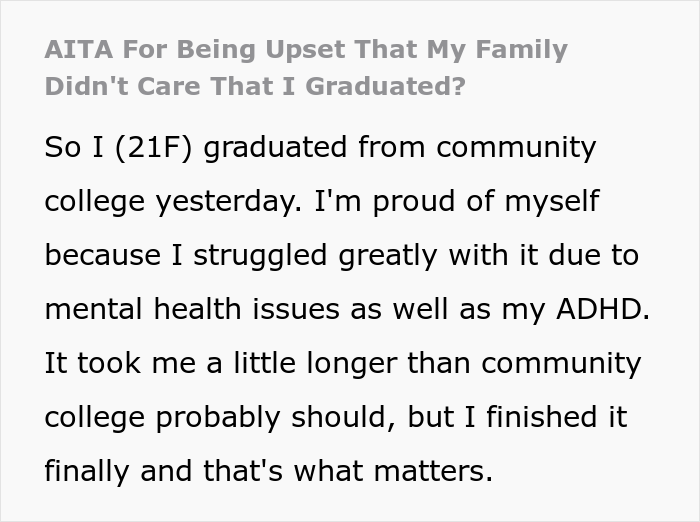
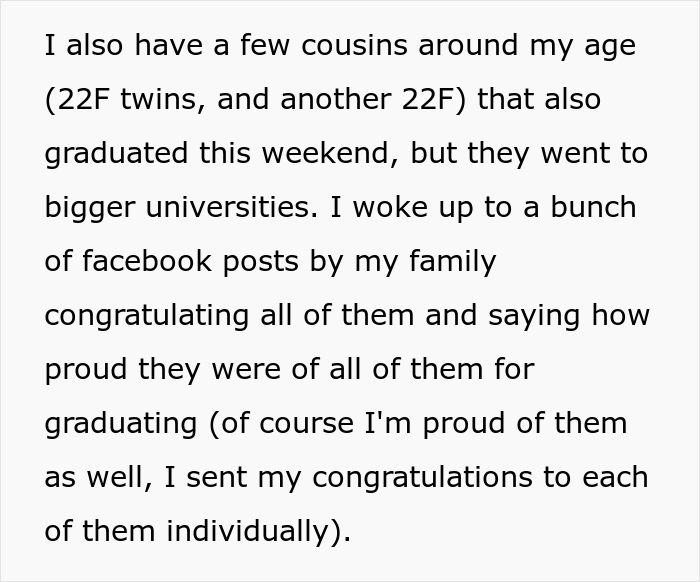

Image credits: English106 (not the actual photo)
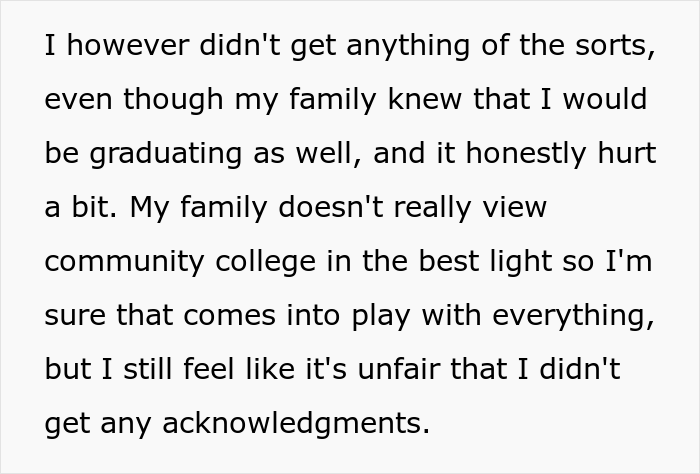





It’s easy to understand why SmallEmoChick feels devastated. Feeling valued, especially by our closest kin, is one of our core needs. Licensed mental health counselor Sara Schapiro-Halberstam said that approval is vital to us because we associate it with survival.
“In the beginning stages of life, the primal brain helps us develop skills to request our needs. As we develop, it makes a non-discriminatory connection: if we want our needs met, we must ensure that our caregivers approve of us and never reject us … Since the primal brain is unable to make distinctions and operates on broad themes, anytime it senses rejection, it panics, concluding that survival is being threatened. Therefore, we begin developing excellent radar that recognizes how we can gain approval,” Sara Schapiro-Halberstam explained.
As children grow, they gather information about what their parent approves of and what they do not. When a parent disapproves of a particular behavior, the child suppresses the behavior. They fear that this negative behavior will deter parental love and approval, which is a threat to survival. This often happens under the radar, too.
“If a parent overtly says, ‘You are laughing too much’ or covertly disapproves of humor, the child suppresses that trait, leaving seriousness in its place,” Schapiro-Halberstam said. “If a parent seems uncomfortable by the child’s adventurous nature, the child quickly learns that being stable will achieve the goal of acceptance. The child chisels and shapes his/her personality and choices according to what s/he believes will impress his/her parents, encouraging them to continue providing survival necessities.”
Parents know that a child doesn’t need to earn our approval in order to be provided for. If your daughter approached you and asked, ‘Mom, what should I do to earn your love?’ you would be baffled. But even if you expressed to your child that she doesn’t need to earn your love, her primal brain wouldn’t believe you. Our subconscious primal instinct demands that we gain favor in our caregiver’s eyes so they will willingly tend to our needs.
The important thing to understand is that the struggle continues even when the child becomes a young adult, gains independence, and no longer needs parental permission. “He makes his own decisions and waits with bated breath for his parent’s approval. Why? Because approval means having our needs met, and having our needs met means survival,” Schapiro-Halberstam repeated. “Though he is an adult and is able to get what he desires on his own, our primal brain never grows up. As we know, it has no sense of time and is irrational. Forever, the adult child keeps waiting, his primal brain convinced that survival is dependent on parental love and approval. If his parents don’t meet him with approval, he continues to live with fear of death in his shadows.”
When parents try to combat this tug-of-war with logic, that doesn’t help either. “[Moms and dads] expect to see a conscious effort to warrant our approval. We wonder why our child doesn’t make a behavioral change in order to impress us. We are confused as to why he cares so deeply about how we perceive him. Just as parents are confused, so are their children. The primal brain’s messages are instinctual and subconscious.”
So no matter if SmallEmoChick’s mother is thinking that she is being overly dramatic, no matter if the woman herself believes that to be the case, she still needs at least a warm hug and a “Good job” for graduating from community college.





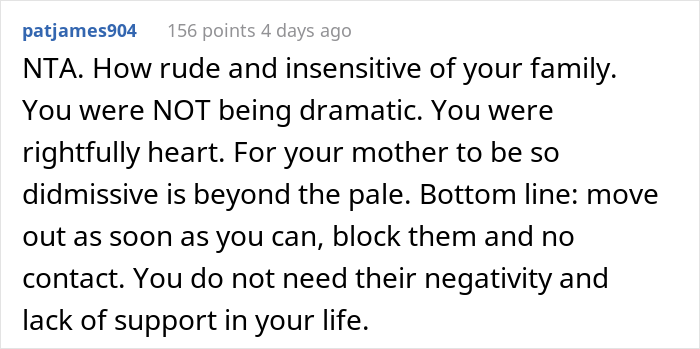
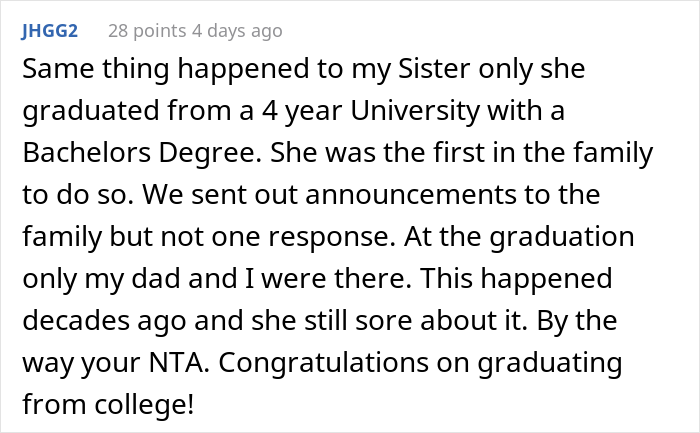


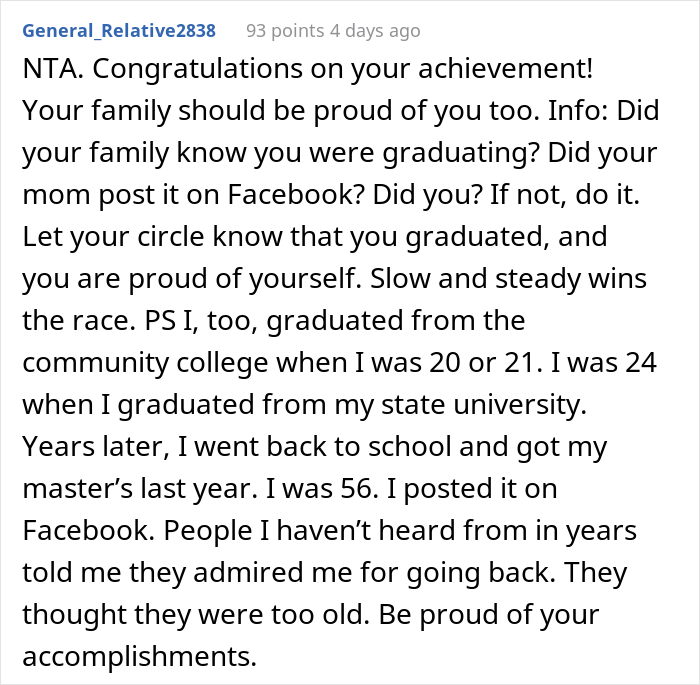



The post "Am I The Jerk For Being Upset That My Family Didn't Care That I Graduated?" first appeared on Bored Panda.
from Bored Panda https://ift.tt/XSAJbU0

